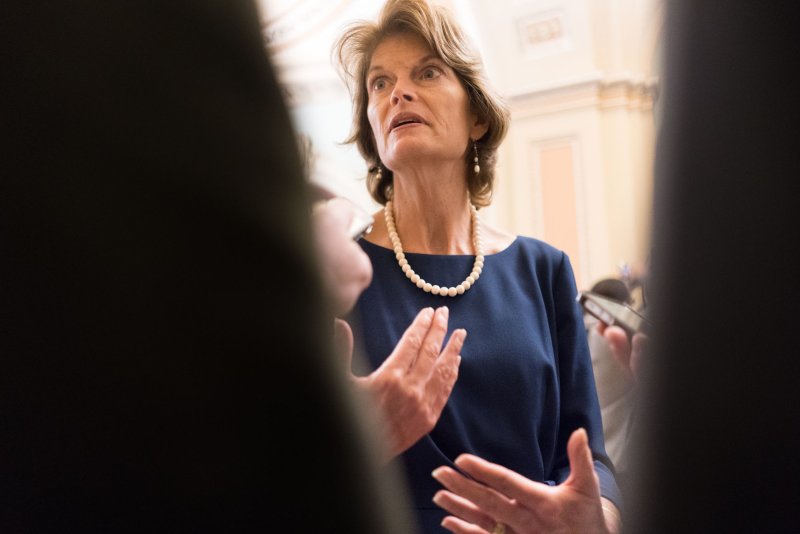Sen. Lisa Murkowski, R-Alaska, has called on the president to recognize it's not just farmers that are impacted by his trade policies -- including economic sectors like energy. File Photo by Erin Schaff/UPI |
License Photo
July 26 (UPI) -- President Donald Trump has been called on by U.S. Sen. Lisa Murkowski, R-Alaska, to take a broad view on trade policies to recognize that impacts extend beyond farming into the energy sector following his announcement of aid for U.S. farmers this week.
Trump unveiled a $12 billion aid package for U.S. farmers during an address in Kansas City earlier this week. Speaking on the issue of trade, the president vowed that farms would be "the biggest beneficiary" of his efforts to address what he sees as lopsided trade relationships.
The support came as farmers faced slumping prices for things like soybeans as a result of broader trade tensions between the United States and China, the world's leading economies.
Outside of the agricultural sector, tariffs on aluminum and steel have sparked concern from the oil and gas industry. Steel pipes are manufactured by only a handful of producers, leaving the U.S. market dependent on foreign supplies that become more expensive through trade barriers.
In response to questions from UPI, U.S. Sen. Lisa Murkowski, R-Alaska, the chairwoman of the Senate Energy Committee, said the $12 billion bailout was a tacit admission by the Trump administration that tariffs were hurting the economy.
"Yet, farmers are hardly the only ones caught in the crossfire -- so, too, are our fishermen, the energy industry, and many others," Murkowski told UPI. "I urge the president to take a broader view of the impacts his trade policy is having and recognize that trade assistance is no substitute for trade itself."
During opening remarks at a hearing on the price of crude oil, Murkowski said this week the U.S. energy sector was on pace for a global leadership position thanks in part to policy moves like lifting a 40-year-old ban on U.S. crude oil exports.
She wondered, however, about the consequences of the lack of infrastructure needed to ensure that U.S. resources can be transported to foreign markets for consumption.
In June, Robin Rorick, the director of midstream and industry operations at the American Petroleum Institute, told the House Subcommittee on Railroads, Pipelines and Hazardous Materials that the industry had concerns that production trends were overtaking takeaway capacity. In a separate report, consultant group IHS Markit found it was the lack of infrastructure, not the lack of spending on exploration and production, that presented a growth challenge for U.S. shale oil.
Ed Longanecker, the president of the Texas Independent Producers & Royalty Owners Association, told UPI the oil and gas industry in Texas wasn't looking for handouts, so much as asking the administration to address the flaws in using national security as a justification for tariffs, so-called Section 232 considerations.
"Recommendations include exempting international steel orders placed prior to the imposition of tariffs or quotas and ensuring companies receive due process in the exclusion request procedures, among others," he said.
Longanecker warned last week that without concessions on steel tariffs, producers may be forced to cut back on production and revise their drilling programs.
Speaking alongside European Commission President Jean-Claude Juncker on Wednesday, the U.S. president said that soybeans were "a big deal," but agreed to work on broader tariff issues with European trading partners.
"This is why we agreed today, first of all, to work together toward zero tariffs, zero non-tariff barriers, and zero subsidies on non-auto industrial goods," Trump said.















